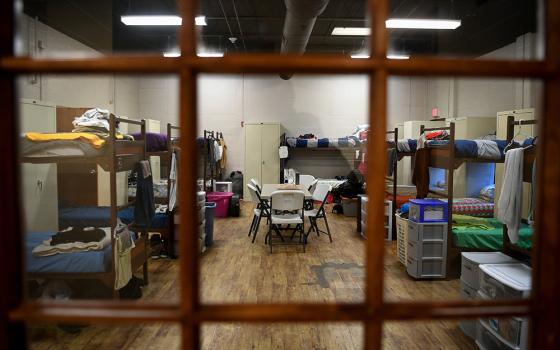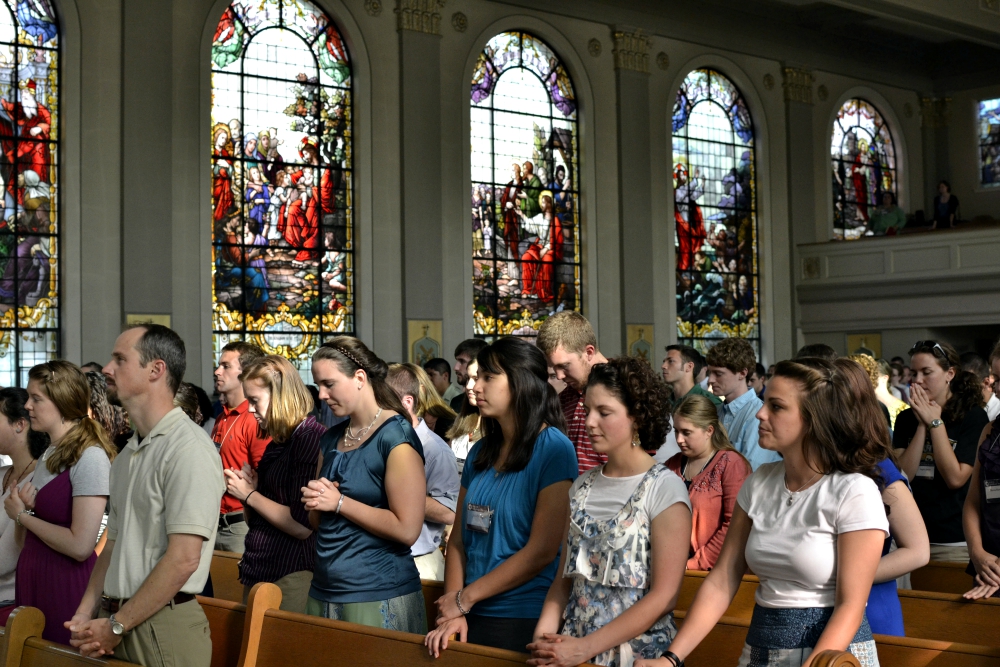
Students involved with FOCUS attend Mass. The Fellowship of Catholic University Students reports that it has more than 660 missionaries on 137 campuses in 38 U.S. states and at four international locations, with an estimated 24,000 students involved. (Courtesy of FOCUS)
While the rest of the Catholic Church is wringing its hands about the "nones" who have distanced themselves from organized religion, thousands of young people spent part of their winter vacation — in frigid Chicago, no less — at a conference about their Catholic faith.
For Madalena DeAndrea, a senior at the University of Colorado Boulder, the highlight of the trip wasn't trying deep-dish pizza or shopping on the Magnificent Mile. It was the hour of kneeling in prayer with 8,000 of her peers for adoration of the Blessed Sacrament in a conference hall filled with wafting incense, reflective music and the host encased in a gold monstrance.
"It was amazing seeing everyone come together in praise and worship and being able to surrender everything," said DeAndrea, who attended the Jan. 2-6 Student Leadership Summit sponsored by the Fellowship of Catholic University Students, known as FOCUS.
The Colorado-based national college outreach program, founded 20 years ago at Benedictine College in Atchison, Kansas, now evangelizes on 137 campuses around the country. With an annual budget of $57 million a year and nearly 800 employees, FOCUS has grown to exert substantial influence on a generation of Catholics, many of whom are unaware of FOCUS' ties to traditionalist and conservative organizations.
Despite its success in reaching large numbers of college students on the campuses where FOCUS sends "missionaries" (its term for on-campus employees), the group has come under criticism for a narrow interpretation of Catholicism and spirituality, a lack of diversity, and insufficient pastoral training of its missionaries.
But DeAndrea has been so inspired by her involvement with FOCUS that she has decided to use her degree in business strategy and entrepreneurship to work for the organization after graduation, leading small-group Bible studies and trying to "disciple" college students in one-on-one relationships.
"FOCUS radically changed my life," said DeAndrea, who grew up Catholic but deepened her faith after connecting with a female missionary on her campus. "She brought me into a closer relationship with Christ. It helped me to be the person I'm meant to be."
A FOCUS women's Bible study group gave Elisa Angevin purpose and strengthened her values — at first. As a freshman at New York University, she met a missionary, who became a mentor and a friend.
But as she met different people outside that community — some of whom were "rubbed the wrong way" by FOCUS — Angevin began to distance herself from the group because it felt exclusionary, rigid and not open to different ways of being Catholic.
"Once you become part of FOCUS, it has a very structured approach," recalled Angevin, now 25 and a social worker in New York. "It created a lot of passion. But a lot of student leaders looked down on other people who didn't have the same passion."
Angevin attended some of FOCUS' mega-conferences, such as the Student Leadership Summit, and was inspired by the speakers and sense of community. "It was empowering to see people my age who were as excited as I was," Angevin recalled. "But as I started to get older, the newness had worn off ... and it felt very closed."
'War for the hearts, minds and souls of this generation'
At the Chicago event, held at the sprawling McCormick Place convention center, FOCUS founder Curtis Martin struts onto the stage, hands in the air, shouting "Woo!" and "Awesome!" to the applauding summit attendees who had been enjoying a contemporary Christian band before his keynote address. Two days earlier, actor Jim Caviezel — Jesus in the Mel Gibson film "The Passion of the Christ" — made a surprise visit to the conference.
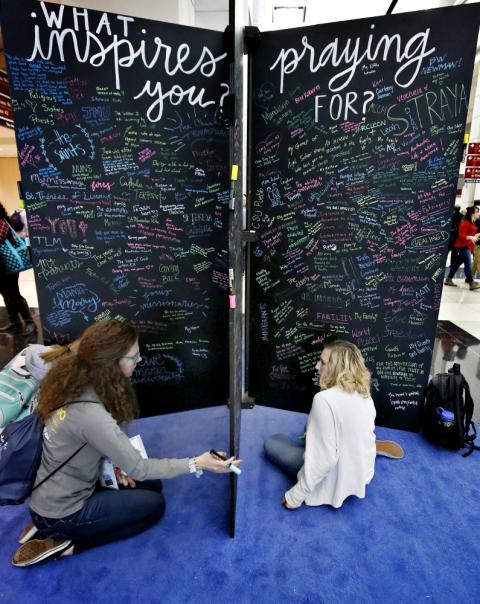
Katie Brown from the University of Toledo, Ohio, and Anna Davis from the University of Missouri Columbia, write their prayer intentions on a wall Jan. 3 during a conference sponsored by FOCUS in Chicago. (CNS/Chicago Catholic/Karen Callaway)
"This is how awesome you are," Martin said. "When the guy who pretended to be Jesus walked in the room, you all stood up and clapped, but when Jesus showed up, you all fell down and knelt. You know the difference. How cool is that?"
Martin, a father of nine, an author and an EWTN television host, proceeded to describe how FOCUS' process of "spiritual multiplication" is akin to Jesus' "finding 12 guys and going camping for three years." The key to successful evangelization is to "choose a few" and get to know them and love them, he said.
While name-dropping his friend George Weigel, a conservative Catholic columnist, and recounting a story of meeting St. Pope John Paul II, Martin is enthusiastic in his attempt to both encourage and challenge a generation from which he, at 56, is now a few decades removed.
Martin founded FOCUS in 1998, with the help of Archbishop Charles Chaput, then-archbishop of Denver, and Edward Sri, a theology professor at Benedictine at the time. Sri is now a faculty member and vice president of mission at the Augustine Institute, a conservative Catholic graduate school dedicated to the "new evangelization" in Denver.
FOCUS started with two missionaries and 24 college students, and in two decades has grown to more than 660 missionaries on 137 campuses in 38 U.S. states and at four international locations. An estimated 24,000 students have been involved with FOCUS, and the organization claims 674 have decided to pursue vocations to the priesthood or religious life.
Those numbers wow Catholic bishops and other leaders, who likely are weary of hearing about the "nones" and the growing numbers of young people who don't even believe in God. FOCUS plays on those fears, with marketing materials that stress the loss of an idyllic time when "we had a mother and a father together under one roof" and good role models like Archbishop Fulton Sheen.
"We're in a war for the hearts, minds and souls of this generation," a promotional video on FOCUS' website says, while flashing statistics about suicide, video games and pornography. "They're growing up in a world with the power to destroy them."
FOCUS promises to "fight for this generation," and transform lonely, disbelieving cellphone addicts into joyful, God-fearing kids who get excited to spend part of their Christmas vacation standing in line to get a book on chastity signed by the author, as happened at the Student Leadership Summit.
That promise is reminiscent of Martin's own conversion story. Raised Catholic, he drifted away from religion during adolescence. In college, he discovered evangelical Protestantism and even became anti-Catholic. Eventually he found his way back to Catholicism.
But he took a page out of the evangelicals' playbook in founding FOCUS, which is clearly modeled after the much larger Campus Crusade for Christ (now branded as "Cru") and InterVarsity Christian Fellowship, which have been around since the 1940s and '50s. Both use small-group Bible studies and one-on-one mentoring to build Christian disciples.
The growth of FOCUS throughout the 2000s happened during a confluence of cultural influences, including the calls for a "new evangelization" during the papacies of John Paul II and Benedict XVI and an influx of evangelical Protestant converts to Catholicism. It also occurred during the sex abuse crisis and economic recession, both of which contributed to financial shortfalls in many U.S. dioceses.
Advertisement
Campus ministries around the country were not immune from these influences, said Kevin Ahern, assistant professor of religious studies at Manhattan College in New York and co-editor of the forthcoming book God's Quad: Small Faith Communities on Campus and Beyond.
"Funding for campus ministries and youth ministries took a huge hit," which resulted in a vacuum at colleges and universities, Ahern said. "FOCUS emerged and started to fill that vacuum."
Not always a good fit
But not everyone has cheered the growth of FOCUS. Critics are reluctant to speak publicly, given the organization's financial resources and connections to prominent Catholic leaders, but even FOCUS admits that its model may not be a good fit for all schools.
An analysis of its existing programs reveals that the organization tends to thrive at large state universities, and that it currently does not employ missionaries at any Jesuit or Lasallian institutions.
FOCUS' absence at Jesuit campuses is not because of any stated policy, said Jesuit Fr. Michael Sheeran, president of the Association of Jesuit College and Universities, but rather the result of a commitment to Jesuit-focused campus ministry at those schools. "We really want [students] to have an experience that is Ignatian at every turn," he said.
Sheeran also noted that campus ministers at Jesuit colleges and universities (and many other schools as well) receive much more training than the four weeks received by FOCUS missionaries.
FOCUS' summer training, currently held at Ave Maria University in Florida — the traditionalist Catholic school started by Domino's Pizza founder Tom Monaghan — is partially dedicated to fundraising, since missionaries are required to fundraise most of their own salaries.
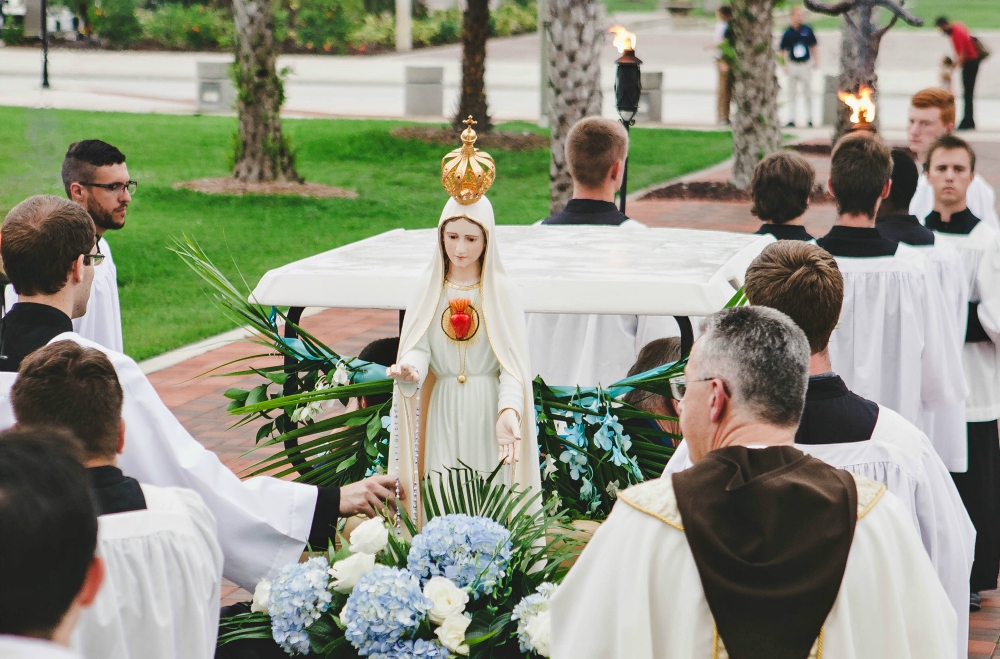
Clergymen walk with a statue of Mary during a June 13, 2017, procession in Ave Maria, Florida, during a ceremony to consecrate the Fellowship of Catholic University Students, or FOCUS, to Mary. (CNS/Courtesy of FOCUS)
Lack of training and experience in pastoral counseling has resulted in some reports of FOCUS missionaries giving overly simplistic advice, especially in matters of sexuality, some campus ministers said.
The FOCUS missionaries placed at the University of Illinois at Chicago over seven years were "wonderful, committed young Catholics," said Fr. Patrick Marshall, chaplain and executive director of the St. John Paul II Newman Center at the university.
Although clearly trained in apologetics and church teaching, they often were not experienced in pastoral application of those teachings. "That was troublesome," Marshall said, noting that especially in cases that involved abortion, abuse or other sensitive matters, "they just weren't equipped to respond in a pastoral way."
So Marshall instructed the missionaries to refer students with those issues to the professional lay campus ministers, who were trained in helping students form Christian consciences to make their decisions. Eventually, he declined to renew FOCUS' contract with the university.
The FOCUS program attracts young people "who wanted certainty," said Marshall, who has worked in campus ministry for 27 years. "I guess the students who did participate felt good about their experience. I'm not sure how much of that is long-lasting."
Earlier in its history, the organization had a reputation for missionaries being heavy-handed in their evangelical zeal, or for not working well with existing campus ministries, though even critics admit FOCUS has made improvements in those areas more recently.
"We try never to be the only Catholic ministry presence on campus," said Hilary Draftz, FOCUS' West Area director. "We always work best with the parish, diocesan or religious order campus ministry that's existing on the campus" — which is the case in more than 90 percent of FOCUS' situations.
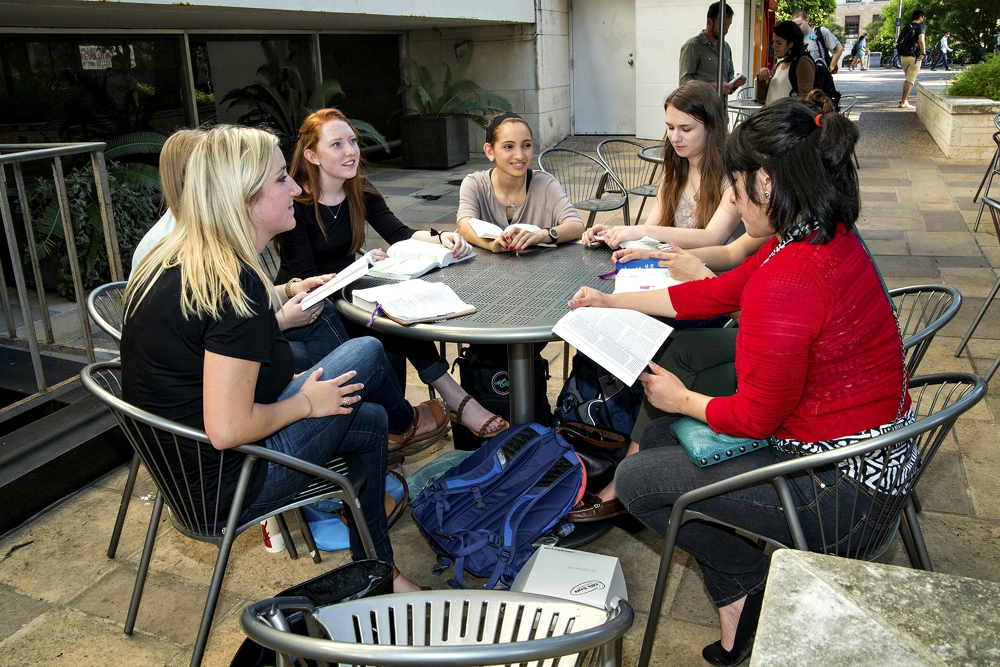
A FOCUS women's Bible study group on campus: FOCUS promises to "fight for this generation," and transform lonely, disbelieving cellphone addicts into joyful, God-fearing kids. (Courtesy of FOCUS)
FOCUS missionaries are not trained — and are not expected — to assist with liturgy, sacramental preparation or RCIA, service projects, retreats and other event planning, or to keep "the Catholic center afloat," Draftz said.
"That allows us to be out on the campus meeting students ... being the arms and legs on campus, drawing students in," said Draftz. Much of a missionary's day is spent just hanging out with students in the dining hall, rec center or coffee house.
But despite FOCUS' promises to increase the number of students attending events at the Sheil Catholic Center at Northwestern University, those numbers did not materialize, according to Mary Deeley, a pastoral associate at the Evanston, Illinois, campus.
"At best, it stayed the same," said Deeley, adding that some students actually stopped hanging out at the center because they were turned off by the FOCUS missionaries' "culture warrior" mentality and individualistic spirituality.
Deeley admired the missionaries for "trying to live a godly, righteous life and for challenging the culture," she said. "But once you want to ask deeper questions and get into the gray areas of life, it doesn't serve as well."
Northwestern ended its contract with FOCUS after three years.
"One size does not fit all when it comes to evangelization," Deeley said. "There are many doors into Catholicism. ... But the FOCUS method, as I observed it, is that there is only one way of practicing the faith."
FOCUS leaders say missionaries come from different backgrounds with varied spiritualties and liturgical tastes. And the program's emphasis on relationships transcends differences, even political ones, since "Christ is the common denominator," said Fr. Michael Schmitz, chaplain for the Newman Center at the University of Minnesota Duluth, which has had FOCUS missionaries for 10 years.
Still, a lack of racial, ethnic and economic diversity among students served by FOCUS is another criticism — and somewhat evident in the faces of the Student Leadership Summit participants and presenters. Nearly every speaker, performer and emcee was white. FOCUS was unable to provide any ethnic or racial data about the summit or other FOCUS participants or employees.
The questions of diversity and "how to be a more inclusive community" are ones that FOCUS and the Catholic Campus Ministry Association are aware of and working on, said Michael St. Pierre, executive director of the association, which works closely with FOCUS.
FOCUS' emphasis on personal piety to the detriment of social issues is also a concern, especially since young people will be disproportionately affected by many of the social injustices facing society today, said Ahern. "Young adults will be drafted for war; they will deal with climate change," he said. "If we're not giving them the tools to think critically through the lens of faith about these issues, then we're doing them a disservice."
When pressed about social justice, FOCUS leaders point to its international mission trips over school breaks. But addressing complex social problems is not the organization's strength, admitted St. Pierre. What it does best is provide young missionaries who are orthodox, faithful to the church, and energetic, he said.
That zeal is attractive to young people who have a desire for adventure and greatness, said John Zimmer, who has been with FOCUS almost since the beginning and is currently vice president of apostolic development.
"Nobody wants to live a pathetic life; nobody wants to sit around and be a bump on a log. They want to live a noble, awesome life," said Zimmer, who said his experiences with the church before college were "blasé" and "milquetoast."
"Sometimes we fall into the trap of being afraid to present the truth of the Gospel, because we're afraid we're going to be persecuted or make the church look rigid," he said.
"Our most successful missionaries express the joy of the Gospel in how they live and how they proclaim the truth," he said. "Not everyone is going to receive it. Sometimes people are not interested, so you say, 'I'm still here and loving you. Let's keep playing Frisbee.' "
That's what DeAndrea, the Colorado college senior ready to commit the next two years of her life to being a FOCUS missionary, wants to do. "It's not about winning people over," she said. "And it's not my role to judge somebody who shies away from church teaching. It's my role to love that person where they're at."
[Heidi Schlumpf is NCR national correspondent. Her email address is hschlumpf@ncronline.org. Follow her on Twitter @HeidiSchlumpf.]






